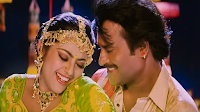Mother of Ironies: Portrayal of Skin Color in Tamil Cinema
We are in the midst of baffling times in terms of Tamil cinematic portrayal of dark skin as opposed to fair skin with different rules written for actors (heroes) and actresses (heroines).
 |
| There's a good balance of OG Tamil skin tones for the heroes, representing diversity and inclusion. |
But the plight of ordinary Janes in the Tamil community who are of the same color as the ordinary Joes is "Vidukathaiya intha vaalkai..." (Why is my life a riddle?)
The casting is bad enough, the scenes already perpetuate skewed neocolonialism, and the songs and dialogues deliver the final nail in the coffin. And I'm here to partly vent and partly point out the harmful effects on the collective Tamil psyche.
In the Thillana Thillana song from Muthu, the dark skinned hero croons to the fair skinned heroine, "There are plenty of fair skinned men out there. Why did you cast your eyes on me, a dark skinned one?" The lady replies, "The sky and sea are dark in color. When I see the sky and sea, I see you."
The entire lyrics of Karuppu Perazhaga work to glorify dark skin on men and establish that only fair skinned women are attractive.
It's ironically maddening to see him spew a dialogue speaking highly of the dark skin on him (representing all dark skinned Tamil men) when the fair skinned heroine rejects him by saying, "This white won't join with this black." The scene unfolds where Raghava is utterly offended by this statement. He gathers his friends and bellyaches about her ridiculing "our dark skin."
Raghava then launches a tirade against fair skin, that his dark skin color is on top of the heroine's head (her black hair) and her fair skin color is at his underfoot.
One would expect that the hero would go on to find a girl who is of his own dark skin color to date. You know, the color he just said is on top of the heroine's head. But no. He still pursues the fair skinned heroine and marries her, successfully entrenching the mother of all ironies.
The song Karuppu tha Enaku Pudicha Color-u talks about how black is beautiful on everything bar women.
And as usual the heroine in the song isn't only fairer than the hero but also the background dancers. The irony...
Hero's dialogue: "I'll know after seeing a girl, that she's my wife."
The hypocrisy trickles to real life as well, in terms of Tamil ethnocentrism.
After importing fair skinned women from North India to act as Tamil ladies in Tamil movies, we will call one of them "Hindi kaari" (Hindi woman) when she makes a home in Tamil Nadu.























Comments
Post a Comment